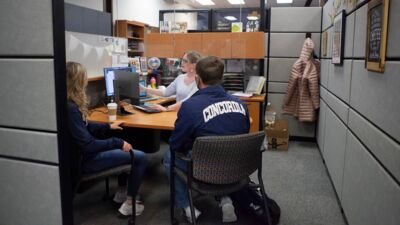Loans
After your scholarships, grants and other forms of aid are factored in, you may find that you need to borrow money from a lender to make up the rest of the cost of your college tuition. Federal student loans and carefully considered private loans are both great options to cover the investment in your future.
Federal Loans
Federal loans are available to students and parents to provide them with funding after all other financial aid options have been exhausted. Unlike other financial aid such as scholarships, awards and grants, loans are borrowed money required to be paid back with interest.
Federal Loan Programs
Federal Loan eligibility is determined upon the completion of the FAFSA. To be eligible for federal loans the student must be a U.S. citizen or an eligible noncitizen.
For a complete student guide on federal loans from the U.S. Department of Education, visit Federal Student Loans at Federal Student Aid.
Direct Student Loans
Federal Direct Loans are low-interest, long-term loans. The two types of Direct Loans a student can be eligible to receive are subsidized and/or unsubsidized loans. Both subsidized and unsubsidized loans have the same terms and conditions, with one exception: Unsubsidized loan borrowers are responsible for interest that accrues while in-school, grace and deferment periods; for subsidized loans, the federal government pays the interest on behalf of the borrower while the student is in school and during the grace period. Subsidized loans are need-based loans determined by the results of the FAFSA.
Students are eligible to borrow up to the maximum amount of loan each year determined by their grade level. Students are eligible for the loan if enrolled at least half time.
- Freshman (0-27 credit hours completed) - $5500
- Sophomore (28-57 credit hours completed) - $6500
- Juniors/Seniors (58+ credit hours completed) - $7500
Independent students can borrow a higher maximum loan amount. For the FAFSA to determine you are an eligible independent student, you must meet the correct dependency guidelines.
Parent Loans for Undergraduate Students (PLUS)
PLUS Loans are federal education loans available to the parents of dependent undergraduate students. To be eligible for the loan, the borrowing parent must have satisfactory credit. There is no minimum or maximum income requirement. The maximum amount parents may borrow on a PLUS loan each academic year is the cost of attendance minus other financial aid received by the student. Go to PLUS Loan for more information.
Parent Instructions: Applying for a Parent Loan for Undergraduate Students
- Apply for a PLUS loan at studentaid.gov. Your parent FSA ID and Password will be required.
- Complete Loan Agreement for a PLUS Loan (MPN) at studentaid.gov. Your parent FSA ID and Password will be required.
- Complete the 2024-25 PLUS Loan Confirmation Statement and submit to the Financial Aid Office. The Financial Aid Office cannot process the PLUS Loan until all three items are completed.
- Upload the completed Plus Loan Confirmation Statement. After submitting the document, you will be sent an email to verify your identity. Please click on the link in that email to complete the submission. The process will not finish until you complete the verification step.
Private Loans
Private loans are credit-based loans from private lenders available to assist families with educational expenses. Interest rates, fees and loan terms will vary depending on the lender chosen and private loans will most likely be more expensive than federal loans.
The lenders on Concordia’s lender list were selected based on the number of Concordia students who chose to borrow from them in the past year. Our institution has worked with these lenders in the past, and previous borrowers had positive experiences working with them. Lenders are reviewed annually to ensure they adhere to our criteria.
You are free to choose any lender including those not presented.
Concordia University’s Student Loan Code of Conduct
- Concordia University does not participate in revenue sharing agreements with lenders or accept inducements of any value from lenders in exchange for preferential treatment on lender lists.
- Concordia University does not participate in contracting arrangements with lenders that provide compensation to the University, its faculty or staff.
- Concordia University does not accept gifts above a nominal value from lenders.
- Concordia University does not assign a lender to a borrower or refuse to certify a loan for a borrower’s choice of lender.
- Concordia University does not allow lenders to help staff their offices for any reason.
- Concordia University and its staff do not accept compensation for service on the advisory boards of lenders.
- Concordia University, its faculty and staff will not enter into any arrangements with lenders that may result in a conflict of interest, perceived or real. This includes refraining from taking any action that is contrary to law, regulation, or the best interests of the students and parents served by the University.
Concordia University's Student Loan Code of Conduct fully complies with the requirements of the Higher Education Opportunity Act of 2008.

Financial Services for Students
Our team of financial counselors are committed to helping you find ways of navigating your college financial needs.
